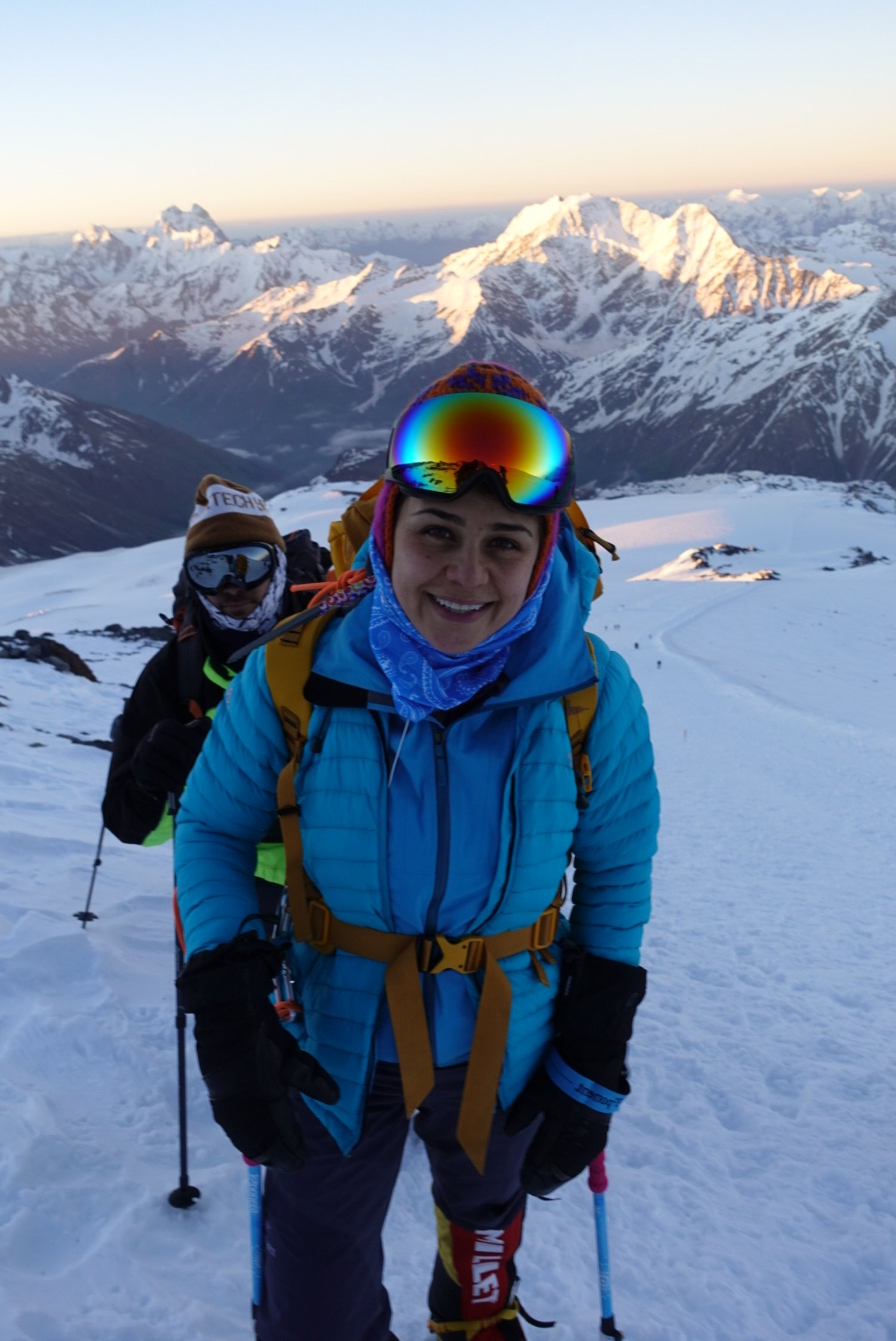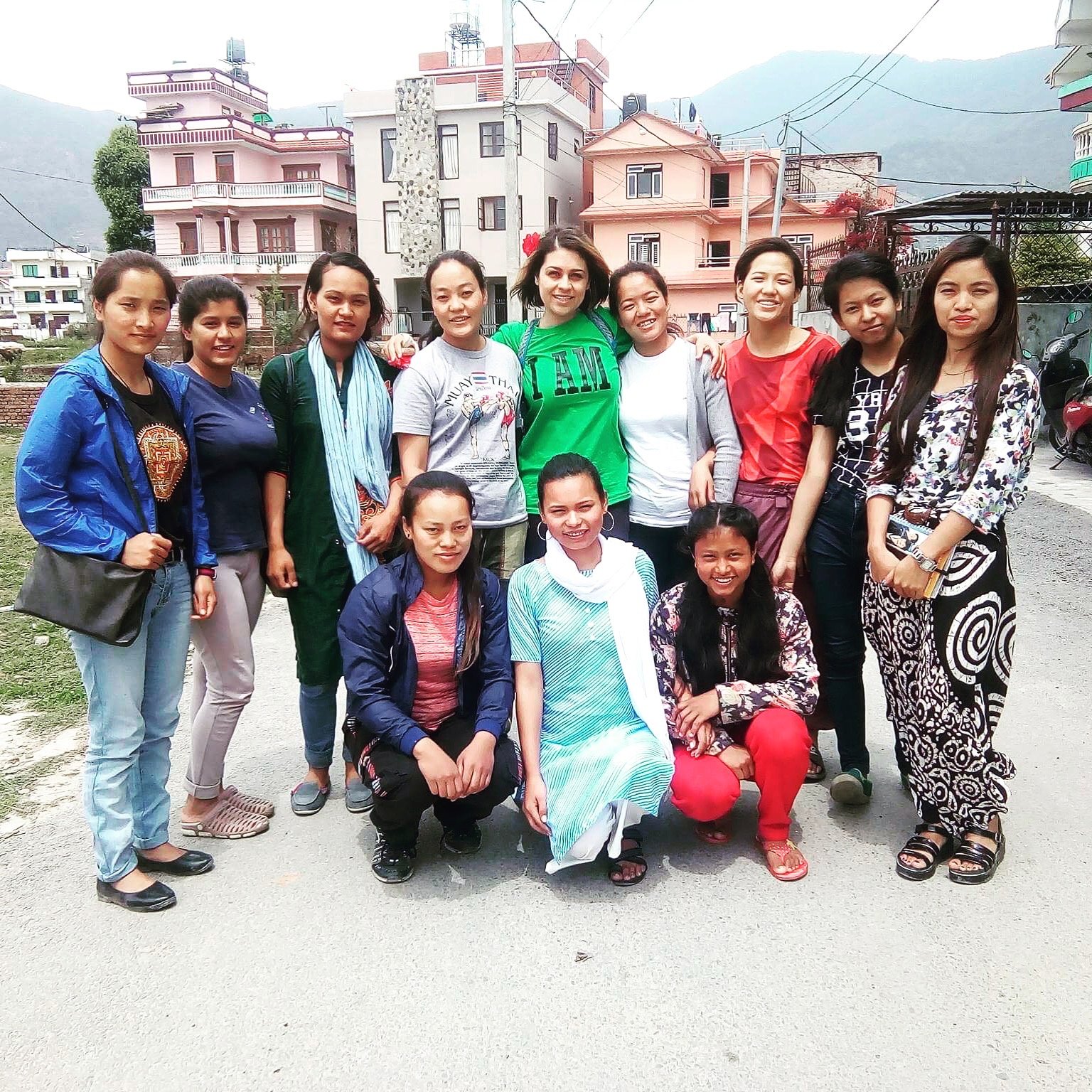Climb Your Everest | Global Connections Call Notes 5.3.23
We all have an Everest to climb. Our days, seasons, years bring us new challenges and opportunities - new Everests! These spaces are ripe for discovery as we explore new ways to practice peace amidst the challenges. Dr. Sara Safari is an author, speaker, mountain climber, college professor, electrical engineer, and advocate for women’s empowerment. She is the founder and president of a nonprofit called Climb Your Everest that focuses on empowering marginalized young women through educational programs. Sara is the first Iranian in history to climb the Seven Summits, the seven highest peaks in each continent. Her historic Everest climb is featured in the Netflix documentary, Aftershock: Everest and the Nepal Earthquake. Sara is also a participant in our current 2023 Peace Practice Alliance cohort.
Sara joined us in May to share her personal practice of peace and the profound insights from her own journey to Everest. We invite you to enjoy the call recording. The following is a summary of our call.
+++++++
Sara started life as a shy young girl in Iran. She felt invisible with no opportunity to share her voice. As a student at UCLA, a professor helped her explore her shyness and find a path forward that launched her exploration of her voice and her search for self-confidence. “It’s not just my issue, it’s the world’s issue…mostly a women’s issue.”
As she pursued a variety of classes to support this self-development, a seminar leader asked her to come up with an impossible project. This is where the decision to climb Mt. Everest began. “I needed to prove I could do something difficult. I wanted to prove myself to others.”
Pausing from her story for a moment, Sara encouraged call participants to consider their own Everests - in relationships, work, any challenge that seems impossible, but you know is possible.
[00:12:00] As a young girl, she was often told ‘no’ to the things she truly wanted to do, from climbing trees, to riding bikes. “I need to modify to suit the needs of society, or my parents…Everyone else tells me what to do. I’m never the decision maker. Finally, somebody told me to pick something impossible and they did not say, ‘If you're a woman from Iran, you’re not allowed to do that’…I got permission to be me.”
Committing to her impulse to climb Everest, Sara exposed all of her concerns and fears at the time. She was not physically fit, had no interest in exercise, hiking, the outdoors, etc. She had no clue how to even attempt this endeavor! Googling “how to climb Everest,” Sara discovered it would be a sixty day journey. She confessed, “ I was lazy. I was scared of taking the first step.” Digging deep, she began the journey by climbing other summits. She kept failing, never making it to the top of any mountains. But Sara was beginning to face her fears of being alone, failing, being cold, dying.
[00:21:00] On the brink of giving up, she met the founder of Empower Nepali Girls, Jeffrey Kottler. She explained to him that she was going to end her efforts. He shared stories of young women in Nepal - human trafficking, child marriage, abuse, lack of education and opportunity. Heartbroken and moved to action, Sara felt she couldn’t go back to her normal life. She became determined to climb with a new incentive - raising $29,000 for 150 girls to go to school. “If in my life I just pay for 150 girls to go to school for one year and I die on Everest, that is the best thing I can do.”
In spring of 2015, Sara went to Nepal to attempt Everest. On April 25th as Sara was climbing an ice wall, a 7.8 magnitude earthquake struck central Nepal. Caught in a literal avalanche and surviving, she soon discovered the greater magnitude of destruction and tragedy that she had narrowly escaped. Learning of her personal story, the donations on her behalf soared over $700,000. (To watch the details of this part of Sara’s journey, we recommend Aftershock: Everest and the Nepal Earthquake.)
[00:23:00] This life-changing experience acted as a catalyst in her growth and transformation. Sara became a witness to a whole new self, the one she was seeking as a young girl in Iran and a young woman in that UCLA classroom. Facing resistance, being alone with her thoughts, and lots of therapeutic tears have all been a part of Sara’s transformation. She outlined four main areas of transformation: physical and emotional strength, courage in the midst of naysayers, confidence in fundraising, and confidence in public speaking. “I had to reverse 30 years of messaging and say ‘You’re good enough. You can do this!’...I learned when I grow in one dimension, all the other dimensions have to grow!...I had to keep meeting the new Sara and not stop myself from growing.”
[00:27:20] The beginner's mind was an important focus. Sara did not want to cap off her learning and growing. “We want to stop. It’s easier. I had to keep telling myself ‘Be open to change.’ You’re not supposed to know the next step. It’s okay to be uncomfortable. It’s okay to be uncertain…Just keep growing and still take your steps.”
[00:29:45] Returning now to the experience of the earthquake, Sara explained the challenges with overcoming the trauma experienced as a result. Her recovery included a lot of writing that eventually turned into a book,Follow My Footsteps: A Journey of Adventure, Disaster, and Redemption Inspired by the Plight of At-Risk Girls. Then she felt ready to go back and climb Everest again. She insisted on being an example for the girls in Nepal who faced much more difficult life circumstances. “I’m going to come back to Everest and not just Everest, I’m going to add six more mountains.” She grew her mission to include seven summits in support of seven non-profits.
The next mountain Sara turned to was starting her own non-profit organization to help the young women in Nepal. Feeling inadequate to the task, she decided to get her PhD in Leadership and Women’s Empowerment. Educating herself for five years, she was clear every single day that she was doing all of this work for the women. With passion and knowledge in tow, the non-profit Climb Your Everest was born. Sara now works with young women in Nepal helping them grow their confidence, capacity, leadership, and entrepreneurship skills.
[00:37] Sara briefly spoke about what she’s currently witnessing in her home country of Iran. On multiple occasions Sara has been arrested when traveling back home for insufficient head coverings. “Now seeing women taking off their headscarves knowing the consequences, it’s so inspiring. It takes so much courage and this inspires me…I hope one day after the revolution to expand my programs into Iran.”
[00:42:00] The need for a personal peace practice is paramount in the work Sara does. One practice she is dedicated to is regular meditation which sometimes includes silent meditation retreats. She keeps photos of many of the Nepali girls on her wall for daily grounding and a reminder of why she is doing this work. Additionally, Sara talks to them daily or weekly and visits them at least twice a year. “Seeing them not having access to any opportunities and still staying motivated and enthusiastic, who am I not to stay enthusiastic!?”
Q & A [00:45:00]
During the difficult times, do you have the feeling of giving up?
“Every day there is a dark moment.” This happens for Sara on the mountain and on the ground in her daily work. She gives herself twenty minutes of soaking in the hardness and emotion of the moment, writing, calling a friend, etc. And then she goes back to work. “I let myself feel the emotion, but I still need to go back and do the things I need to do.”
Do you have ideas about the root causes of the cultural practices that harm, specifically the practice of men raping young virgins to cure disease including HIV?
This is one of the bigger challenges. “This mountain that I’m climbing doesn’t feel like it has a summit.” Over the years she has been learning so much from other organizations who are working through similar issues. Sara finds connecting with others in similar work builds even more awareness and solution-oriented thinking.
Can you give us a window into the work that you’re doing with the young girls?
The program is a six month educational program that is co-created with the girls she works with. They review the challenges and problems faced in their individual lives and communities. “Their feedback becomes the course, telling us what they need.” Sara works with a cohort on a weekly basis over the six months which culminates in an in person visit that includes workshops and a graduation. The graduated cohort then become the mentors and instructors for the new cohort. “My job is to empower and give resources so they can take over the whole thing on day!” Eventually Sara hopes to take this program into new countries as well.
In the work of empowerment there is a tension when breaking down the old systems to create new models. Do you address the tension of the discomfort and danger that is a part of this work? How do you prepare them for that?
Towards the end of the program both online and in person, there are two areas of focus - 1) tempered radicalism, staying empowered in a disempowered system, and 2) relapse prevention, how to carry the ideas learned forward. There is a real effort to create ongoing community care in order to help all of them feel supported and sustained.
Conclusion [01:05:27]
Going back to Everest after seven years was very difficult. Sara was still carrying some trauma. She felt she could easily justify not returning to the climb; there was no need to relive the trauma. And yet, she felt impelled to return. Sara dug deep and began the climb again. As she reached the wall where she had experienced the earthquake seven years prior, all of the emotions of that day returned; all of the voices that told her to stop trying returned. “I didn’t want to climb. I was frozen. I was crying. I cannot do this…what if this whole thing collapses on me…Going back was not about the summit, it was facing the trauma again.”
“We all have traumas in our lives.” She began to think about all the traumas in her life since early childhood, all the messages that told her she couldn’t do what she wanted to do or be who she wanted to be. It was truly a spiritual experience as she climbed the wall in tears. Speaking to the wall aloud she cried, “I hate you. I hate you. I hate you. I don’t want to be here.” She still took the steps, still continued to climb. “All of us have traumas…We let it be a wall for us the rest of our lives. We let it tell us what to do and not do, to limit us. For me the wall was a limit and I had to face it.” It wasn’t about getting to the summit. It was all about the wall. “It started with I hate you, I hate you, I hate you. And it turned into I love you wall. Thank you for giving me so many opportunities - to start my non-profit, to write my book, to empower me to help so many women.”
“It took me sixty days of crying, but I went from I hate you to I love you. That was the journey, not the summit…We all have walls. I said at the beginning I want you to find your Everest, but really you need to find the walls that are stopping you from climbing your Everest.”




